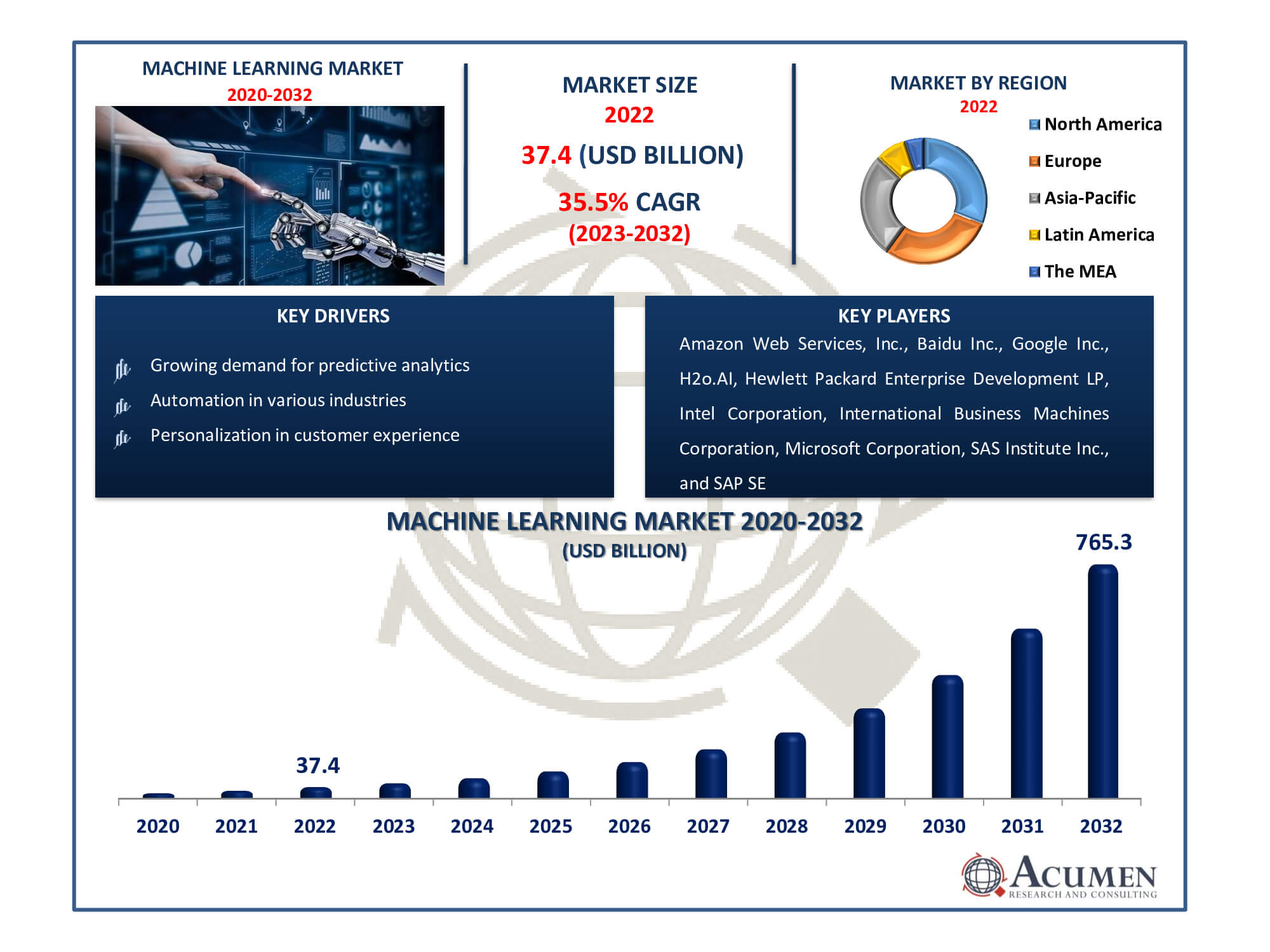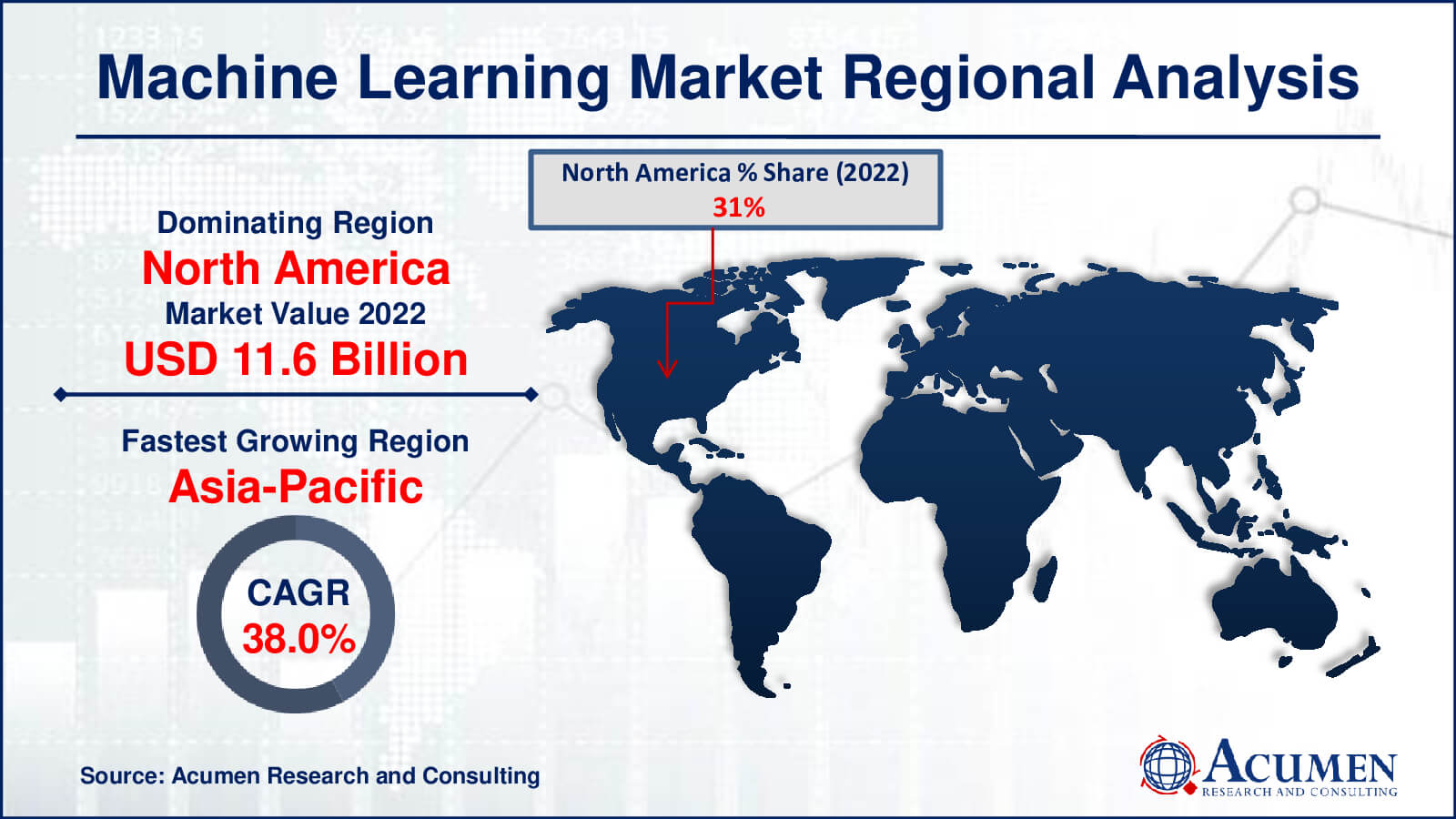Machine Learning Market Size - Global Industry, Share, Analysis, Trends and Forecast 2023 - 2032
Published :
Report ID:
Pages :
Format :
Machine Learning Market Size - Global Industry, Share, Analysis, Trends and Forecast 2023 - 2032
Report Coverage
- Industry Dynamics
- Market Size and Forecast Data
- Segment Analysis
- Competitive Landscape
- Regional Analysis with a Niche Focus on Country-Level Data
- High Level Analysis - Porter's, PESTEL, Value Chain, etc.
- Company Profiles of Key Players
- Option to Customize the Report As Per Your Specific Need
Request Sample Report
The Machine Learning Market Size accounted for USD 37.4 Billion in 2022 and is estimated to achieve a market size of USD 765.3 Billion by 2032 growing at a CAGR of 35.5% from 2023 to 2032.
Machine Learning Market Highlights
- Global machine learning market revenue is poised to garner USD 765.3 Billion by 2032 with a CAGR of 35.5% from 2023 to 2032
- North America machine learning market value occupied around USD 11.6 billion in 2022
- Asia-Pacific machine learning market growth will record a CAGR of more than 38% from 2023 to 2032
- Among component, the services sub-segment generated over US$ 19.4 billion revenue in 2022
- Based on enterprise size, the large enterprises sub-segment generated around 66% share in 2022
- Predictive maintenance, reducing equipment downtime through ML analytics is a popular machine learning market trend that fuels the industry demand

Machine learning is a subset of artificial intelligence technology that grants systems the ability to learn and improve from experience without requiring detailed programming. It centers on developing computer programs capable of accessing data and learning autonomously. As its name suggests, the primary goal of machine learning is to enable computers to learn without direct human intervention. This capability allows for the swift analysis of vast datasets, delivering more accurate results for identifying profitable opportunities and potential risks. Machine learning has quickly emerged as a key tool for many different businesses. The market for machine learning is expanding at an exponential rate due to the unquenchable need for insights derived from data. Businesses and organizations are using machine learning to improve decision-making, expedite procedures, and unleash potential that was previously unrealized across a variety of industries, including healthcare, banking, and autonomous cars. This dynamic area is always coming up with new ideas and opportunities that could completely change the way we work with data and make decisions.
Global Machine Learning Market Dynamics
Market Drivers
- Growing demand for predictive analytics
- Automation in various industries
- Personalization in customer experience
- Increasing data accessibility
Market Restraints
- High implementation costs
- Lack of skilled workforce
- Data privacy concerns
Market Opportunities
- Enhanced cybersecurity
- Healthcare advancements
- Machine learning can optimize urban infrastructure
Machine Learning Market Report Coverage
| Market | Machine Learning Market |
| Machine Learning Market Size 2022 | USD 37.4 Billion |
| Machine Learning Market Forecast 2032 | USD 765.3 Billion |
| Machine Learning Market CAGR During 2023 - 2032 | 35.5% |
| Machine Learning Market Analysis Period | 2020 - 2032 |
| Base Year |
2022 |
| Forecast Data | 2023 - 2032 |
| Segments Covered | By Component, By Enterprise Size, By Deployment, By End-Use, And By Geography |
| Regional Scope | North America, Europe, Asia Pacific, Latin America, and Middle East & Africa |
| Key Companies Profiled | Amazon Web Services, Inc., Baidu Inc., Google Inc., H2o.AI, Hewlett Packard Enterprise Development LP, Intel Corporation, International Business Machines Corporation, Microsoft Corporation, SAS Institute Inc., and SAP SE. |
| Report Coverage |
Market Trends, Drivers, Restraints, Competitive Analysis, Player Profiling, Covid-19 Analysis, Regulation Analysis |
Machine Learning Market Insights
A wide range of applications is a key driver of the demand for machine learning, contributing to market growth. For example, in the advertising industry, machine learning is used to predict customer behavior, thereby refining advertising campaigns. Artificial intelligence-driven marketing employs various models to automate, optimize, and enhance data usage. In the banking and finance sector, machine learning plays a crucial role in asset management, loan approval, and other processes. This technology is also applied to areas such as document management, security, and healthcare, further stimulating market growth.
Developing countries in the Asia-Pacific and Latin America regions hold significant potential for the machine learning-as-a-service market. Their growing infrastructure and expanding adoption base make them promising markets. Moreover, the increasing demand for cost-effective predictive solutions in various industries is expected to drive the need for machine learning services.
The healthcare industry has a large opportunity for the machine learning market. Through the analysis of large medical datasets, machine learning has the potential to transform medication discovery, diagnosis, and patient care. It makes it possible to create models that forecast disease outbreaks and the outcomes of specific patients. The possibility for more precise and customized healthcare solutions increases as healthcare practitioners use these technologies more frequently, ultimately improving patient outcomes and lowering medical expenses.
Machine Learning Market Segmentation
The worldwide market for machine learning is split based on component, enterprise size, deployment, end-use, and geography.
Machine Learning Component
- Hardware
- Software
- Services
Based on the component, the market has been divided into hardware, software, and services. As per the machine learning industry analysis, the services segment accounted for the largest in 2022. The second largest segment is expected to the software of the market in previous years due to the high adoption of cloud-based software. This can be attributed to improved cloud infrastructure and hosting parameters. However, the hardware segment is anticipated to observe the fastest growth rate during the forecast period. This is due to the growing demand for hardware optimized for machine learning, an increasing number of hardware providers, and technological development such as customized silicon chips with machine learning and artificial intelligence capabilities.
Machine Learning Enterprise Size
- Large Enterprises
- SMEs
Based on the enterprise size, the global machine learning market is segmented into small & medium-sized enterprises (SMEs) and large enterprises. According to the machine learning market forecast, the large enterprise segment is expected to for the largest share of the market from 2023 to 2032. This can be attributed to the capability of investment and focus of large enterprises on connecting machine learning, deep learning, and optimization of decisions to deliver high business value. However, the adoption of machine learning is rapidly growing across small and medium-sized enterprises. This is majorly due to the cost-effective and easy deployment offered by service providers. Furthermore, the availability of options for deployment methods such as on-premise, cloud-based, or hybrid to easily scale-up pilot projects of small and medium-sized enterprises is likely to increase the demand for machine learning from SMEs.
Machine Learning Deployment
- Cloud
- On-premise
For a number of reasons, the machine learning market's cloud category is the largest. Businesses find cloud-based deployment appealing because it provides scalability, flexibility, and cost-effectiveness. It dispenses with the necessity for large upfront infrastructure investments, giving businesses on-demand access to potent machine learning capabilities. Furthermore, cloud platforms make it simple to integrate machine learning with other technologies and data sources, which streamlines the implementation process. Because of its ease of use and effectiveness, cloud-based machine learning solutions are becoming more widely used in a variety of industries, dominating the market for deployment options.
Machine Learning End-use
- Healthcare
- Law
- BFSI
- Advertising &Media
- Retail
- Agriculture
- Automotive & Transportation
- Manufacturing
- Others
Based on the end-user, the market is divided into healthcare, law, BFSI, advertising & media, retail, agriculture, automotive & transportation, manufacturing, and others. Advertising and media held the largest share of the market in 2022. However, healthcare is anticipated to observe significant growth and is expected to surpass advertising & media during the forecast period. This is due to broadening the application of machine learning technology in the healthcare industry such as the use of technology for better diagnosis and predicts the probability of death of the person. The law segment is witnessing the fastest growth in the coming years.
Machine Learning Market Regional Outlook
North America
- U.S.
- Canada
Europe
- U.K.
- Germany
- France
- Spain
- Rest of Europe
Asia-Pacific
- India
- Japan
- China
- Australia
- South Korea
- Rest of Asia-Pacific
Latin America
- Brazil
- Mexico
- Rest of Latin America
The Middle East & Africa
- South Africa
- GCC Countries
- Rest of the Middle East & Africa (ME&A)

Machine Learning Market Regional Analysis
North America accounted for the maximum share of the market. This can be attributed to the presence of numerous banking organizations, investments in machine learning-based firms, and high adoption of next-generation technologies in the region. Approximately 2900 companies operate in the machine learning market in the U.S. However, the Asia Pacific is expected to experience the fastest growth during the forecast period. Increasing adoption of machine learning technology in emerging and developed countries such as India, China, and Singapore, government support for next-generation technologies, and investments by service providers due to the presence of a talent base are expected to boost market growth in the coming years. For instance, NITI Aayog, a policy think tank of the Government of India, collaborated with Google LLC, a multinational technology company, to incubate and train AI-based start-ups in India.
The machine learning market is expanding at the quickest rate in the Asia-Pacific area. There are a number of explanations for this extraordinary increase. Machine learning technology is becoming more and more popular in developed and emerging economies like Singapore, China, and India. This quick growth is facilitated by substantial investments made by service providers and government backing for cutting-edge technologies, as well as the availability of a highly qualified labour pool. The region's dedication to expanding machine learning is demonstrated by collaborative projects like NITI Aayog's cooperation with Google to train and nurture AI-based start-ups in India, which serves as a hub for innovation and market growth.
Machine Learning Market Players
Some of the top machine learning companies offered in our report includes Amazon Web Services, Inc., Baidu Inc., Google Inc., H2o.AI, Hewlett Packard Enterprise Development LP, Intel Corporation, International Business Machines Corporation, Microsoft Corporation, SAS Institute Inc., and SAP SE.
Frequently Asked Questions
How big is the machine learning market?
The market size of machine learning was USD 37.4 billion in 2022.
What is the CAGR of the global machine learning market from 2023 to 2032?
The CAGR of machine learning is 35.5% during the analysis period of 2023 to 2032.
Which are the key players in the machine learning market?
The key players operating in the global market are including Amazon Web Services, Inc., Baidu Inc., Google Inc., H2o.AI, Hewlett Packard Enterprise Development LP, Intel Corporation, International Business Machines Corporation, Microsoft Corporation, SAS Institute Inc., and SAP SE.
Which region dominated the global machine learning market share?
North America held the dominating position in machine learning industry during the analysis period of 2023 to 2032.
Which region registered fastest CAGR from 2023 to 2032?
Asia-Pacific region exhibited fastest growing CAGR for market of machine learning during the analysis period of 2023 to 2032.
What are the current trends and dynamics in the global machine learning industry?
The current trends and dynamics in the machine learning industry include growing demand for predictive analytics, automation in various industries, personalization in customer experience, and increasing data accessibility.
Which component held the maximum share in 2022?
The services component held the maximum share of the machine learning industry.


